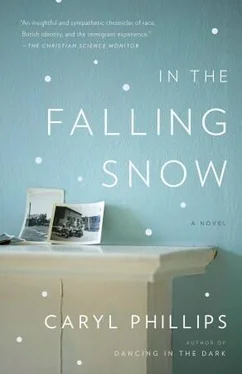That evening, Annabelle called her mother and said that they were thinking of motoring down on Sunday. There was a long silence on the other end of the telephone and then Annabelle heard her mother’s hesitant voice.
‘Sunday?’ She paused. ‘This Sunday?’
Again Annabelle repeated the plan, stressing the fact that Keith would be driving the car so that there could be no misunderstanding as to what she was proposing. There was another long silence and a worried Annabelle felt compelled to ask, ‘Are you there, Mummy?’ She heard her mother cough quietly and then pull herself together.
‘Yes, dear, of course I’m here. And Sunday should be fine, but I’ve been meaning to tell you, Annabelle, that things with your father are a little difficult. Apparently the doctor thinks he might have the dreaded big “c”. She paused. ‘Cancer. Of the lungs, he says, but that doesn’t make any sense for your father hasn’t smoked a cigarette since he left the army, and that was aeons ago.’
On the journey down from London, Annabelle kept twisting around in her seat and dabbing Germolene on Laurie’s bruised lip where the boy who had called him a ‘halfie’ had hit him. Clearly, Laurie didn’t like his mother’s attention, so he kept squirming away from her and jiggling the packet of sunflower seeds that he had bought as a present for his grandmother. He was excited that they were finally going to visit Grandma’s home, where he would also meet his grandfather, but even happier to know that she had a big garden, as opposed to their own tiny one, and lots of space in which she could plant flowers. Annabelle had just helped Laurie with a school project on the different uses of sunflowers, and because the teacher had told him that sunflowers needed a lot of space to grow Laurie had decided that he wanted to bring sunflower seeds for Grandma. When Laurie dropped off to sleep, Annabelle finally had the opportunity to tell her husband what she had wanted to say since he had suggested that they make this trip. First, she wanted to apologise again for what she had done all those years earlier when she had lied to him about going to the theatre, but more importantly, even at this late stage, she wanted to let him know that she really didn’t need to see her father again. His use of the term ‘nigger-lover’, while knowing that she had an unborn child in her body, had irreparably broken something between them. As she sat and cried on the platform at Ashleigh station, and waited for the train that would take her back to London, she had finally come to accept that her father was weak, pathetic even, and she felt not a jot of hostility towards him. In fact, once the flood of tears had subsided, she finally understood that what she felt towards him was a remote indifference, which she knew she could cope with. However, what caused her a real shock was the realisation that she was experiencing a rising tide of admiration for her mother who stoically, over the years, had been living with a man she feared, and for whom she clearly had little affection.
Annabelle looked across the table at her gaunt father, who was propped up under a heavy blanket that reached to his chest, then at her husband, and then she stood up and left the two men at the table and joined her mother in the kitchen. Her mother passed her a wooden mallet and Annabelle slapped a bulb of garlic and watched as the cloves collapsed into a flower. Through the window they could both see Laurie on the expansive back lawn, wheeling around in circles and chasing butterflies. Back in the living room, neither man would look at the other. Annabelle’s father pointed out of the window towards Laurie.
‘How old is the boy now?’
‘Ten. He was ten last month.’
‘I see.’ Annabelle’s father began to nod as though approving of the fact that his grandson had crossed this threshold. ‘And the name, Laurie. Is that with a “w” or with a “u,” because there are two ways of spelling the word, or so I’m led to believe.’
‘It’s with a “u”. We named him after Laurie Cunningham.’ He paused and looked at his father-in-law, whose strangely dull eyes seemed to have lost their ability to reflect light. He felt sorry for him, for the man seemed to be permanently thrashing about in his mind. ‘He was a footballer who I used to like a lot. He played for England, but died young in a car crash. In Spain in the late eighties, I think.’
‘I see. Did you know the chap?’
‘Know him? You mean personally?’
‘Was he a chum?’
‘I didn’t know him, but Annabelle and I both liked the name.’
‘Well, given the bruise on the boy’s face perhaps you should have named him after a boxer. Henry, maybe. He’s got to learn to stand up for himself. No feather-bedding. People can be very cruel, you do understand that, don’t you?’
Through the window he could see his son charging happily about the vast expanse of the cottage’s neatly manicured lawn.
‘Yes,’ he said, transferring his attention to his ailing father-in-law. ‘I have some understanding of how cruel people can be.’
‘Well jolly good. I’m pleased to hear it.’ For a moment they were enveloped in a cheerless silence that was punctuated by the sound from the kitchen of clean cutlery being dropped into the appropriate sections of the silverware drawer. ‘Now then, you do love my daughter, don’t you? I mean really love her.’
As the train leaves Ladbroke Grove station and begins to sweep left in a wide arc towards Latimer Road, he notices that most of the empty carriage seats are covered in discarded crisp packets, empty cans of Coke, and abandoned free newspapers. Kids, he thinks. Every day now he witnesses packs of these youngsters on the street, or on the tube, or on the buses, swearing and carrying on with a sense of entitlement that is palpably absurd. Each of them seems to believe that he or she is an ‘achiever’, and that they deserve nothing less than what they call ‘maximum respect’. Thank God, Laurie isn’t like this, although Annabelle appears to be increasingly concerned by his behaviour. He has tried to explain to her that all teenage boys go through some form of rebellion, and that she shouldn’t take Laurie’s surliness as evidence of anything more than his ongoing, turbulent, passage out of childhood and into the no man’s land of young adulthood. The urgency of Annabelle’s recent messages speaks both to her disappointment with him as a husband and father, and to her concern for their son, although he senses that some other anxiety is troubling her which she will most likely never reveal to him or, he suspects, to this new friend, Bruce. He stands to get off the train and he glances again at the old lady, who appears to have neither accepted nor totally rejected the ill-manners of the teenagers, but rather to have achieved an enviable place of quiet serenity. She raises her eyes to meet his own, and she smiles. As the train pulls away he can see her, still smiling at him, through the filthy carriage window.
He steps out of the tube station and into the frigid November air. It is Sunday evening, so the traffic is not nearly as heavy as it might be on a weekday, but he assumes that there must have been a gig at the Empire for people are impatiently sounding their horns and he can see that there’s some kind of bottleneck at the roundabout. Across the street he sees the blue and white neon lights of the new Cineplex that he once went to with Yvette. He cannot remember the name of the romantic comedy that they sat through, for he fell asleep soon after the opening credits. After the film, her sullen silence at Pizza Express spoke volumes about her sense of disappointment. The trip to the cinema took place before he began visiting her north London terraced home, so in a sense she had no right to be irritated with him. As he forked the last slice of margarita into his mouth, he looked across the table at her but she would not meet his eyes. For Christ’s sake, he thought, these things happen and it was hardly a criticism of her. She, more than anybody else, should understand that he has been working hard, and he was just tired, and that’s all there is to it. End of story. As the waitress placed the stainless steel tray which held the bill to the side of his now empty plate, he reached for his credit card and wished that she would get over her disgruntlement and grow up. Her sullen demeanour had managed to cast a cloud over a perfectly nice evening and a pretty good pizza. He turns towards Uxbridge Road, and wonders how the atmosphere will be when Yvette comes to work in the morning. He had tried to explain to her that all he wanted was for things to return to how they used to be before they got involved, but as he nervously redistributed his weight on the designer barstool, then sipped at his warm white wine, the look on her face made it clear that she was in no mood to end their arrangement amicably.
Читать дальше









![Unknown - [Carly Phillips] The Bachelor (The Chandler Brothe(Bookos.org) (1)](/books/174132/unknown-carly-phillips-the-bachelor-the-chandle-thumb.webp)


